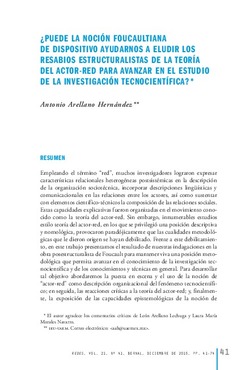¿Puede la noción foucaultiana de dispositivos ayudarnos a eludir los resabios estructuralistas de la teoría del actor-red para avanzar en el estudio de la investigación tecnocientífica?
Can the foucaultian notion of dispositif help us to escape from the structuralist vices of actor-network theory in order to move forward in the study of technoscientific research?

Ver/
Fecha
2015-12Autor
Arellano Hernández, AntonioResumen
Empleando el término “red”, muchos investigadores lograron expresar características relacionales heterogéneas postsistémicas en la descripción de la organización sociotécnica, incorporar descripciones lingüísticas y comunicacionales en las relaciones entre los actores, así como sustentar con elementos científico-técnicos la composición de las relaciones sociales. Estas capacidades explicativas fueron organizadas en el movimiento conocido como la teoría del actor-red. Sin embargo, innumerables estudios estilo teoría del actor-red, en los que se privilegió una posición descriptiva y nomológica, provocaron paradójicamente que las cualidades metodológicas que le dieron origen se hayan debilitado. Frente a este debilitamiento, en este trabajo presentamos el resultado de nuestras indagaciones en la obra posestructuralista de Foucault para mantener viva una posición metodológica que permita avanzar en el conocimiento de la investigación tecnocientífica y de los conocimientos y técnicas en general. Para desarrollar tal objetivo abordaremos la puesta en escena y el uso de la noción de “actor-red” como descripción organizacional del fenómeno tecnocientífico; en seguida, las reacciones críticas a la teoría del actor-red; y, finalmente, la exposición de las capacidades epistemológicas de la noción de “dispositivo” de Foucault para avanzar los estudios sociales de la ciencia y la tecnología, privilegiando una actitud analítica en lugar de una ambición nomológica. By using the concept of network, many scholars were able to express heterogeneous, relational, post-systems aspects in the description of the sociotechnical organisation; they were also able to incorporate linguistic and communicational descriptions in the relations among actors and to support with scientific and technical elements the composition of social relations. These explanatory capabilities were organised in the movement known as Actor-Network-Theory (ant). However, after the rise of countless antstyle studies that privileged a descriptive and nomological position, the result of this was, paradoxically, the weakening of ant’s original methodological qualities. In this context, this article presents the result of our analysis of Foucault’s post-structuralist work, in order to keep alive a methodological position capable to move forward in the knowledge of technoscientific research and of knowledges and technics in general. To do this, we explore the development and use of the notion of actor-network as an organizational description of the technocientific phenomenon; then, we analyse the common criticisms towards ant. Finally, we present the epistemological capabilities of Foucault’s notion of ‘dispositif ’, this in order to help science and technology studies to move forward favouring an analytic attitude rather than a nomological ambition.
